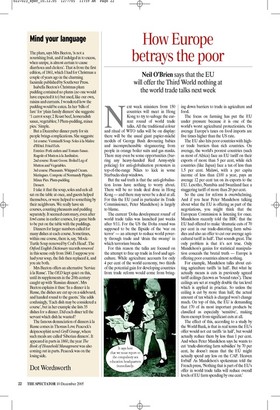Mind your language
The plum, says Mrs Beeton, ‘is not a nourishing fruit, and if indulged in to excess, when unripe, is almost certain to cause diarrhoea and cholera’. That is from the first edition, of 1861, which I had for Christmas a couple of years ago in the charming facsimile published by Southover Press.
Isabella Beeton’s Christmas plum pudding contained no plums (no one would have expected it to) but used, like our own, raisins and currants. I wondered how the pudding would be eaten. In her ‘bills of fare’ for ‘plain family dinners’ she suggests: ‘1 carrot soup; 2 Roast beef, horseradish sauce, vegetables; 3 Plum-pudding, mince pies.’ Simple.
But a December dinner party for six people brings complications. She suggests: 1st course: Vermicelli Soup. Soles à la Maître d’Hôtel. Fried Eels.
Entrées: Pork cutlets and Tomato Sauce. Ragoût of Mutton à la Jardinière.
2nd course: Roast Goose. Boiled Leg of Mutton and Vegetables.
3rd course: Pheasants. Whipped Cream. Meringues. Compote of Normandy Pippins. Mince Pies. Plum-pudding.
Dessert.
I take it that the soup, soles and eels all sat on the table at once, and guests helped themselves, or were helped to something by their neighbours. We really have six courses, counting pheasants and pudding separately. It seemed customary, even after fowl came in earlier courses, for game birds to be put on the table with the puddings.
Dinners for larger numbers called for many dishes at each course. Sometimes, within one course, there is, say, ‘MockTurtle Soup removed by Cod’s Head’. The Oxford English Dictionary records removed in this sense only from 1840. I suppose you had your soup, the fish then replaced it, and you ate both.
Mrs Beeton offers an alternative ‘Service à la Russe’. The OED kept quiet on this, until its supplements in the 20th century caught up with ‘Russian dinners’. Mrs Beeton explains it thus: ‘In a dinner à la Russe, the dishes are cut up on a sideboard, and handed round to the guests.’ She adds confusingly, ‘Each dish may be considered a course’, but in her example she lists 35 dishes for a dinner. Did each diner tell the servant which dish he wanted?
The famous denunciation of dinners à la Russe comes in Thomas Love Peacock’s deipnosophist novel Gryll Grange, where such meals are called ‘Siberian dinners’. It appeared in parts in 1860, the year The Book of Household Management was also coming out in parts. Peacock was on the losing side.
Dot Wordsworth

























































 Previous page
Previous page